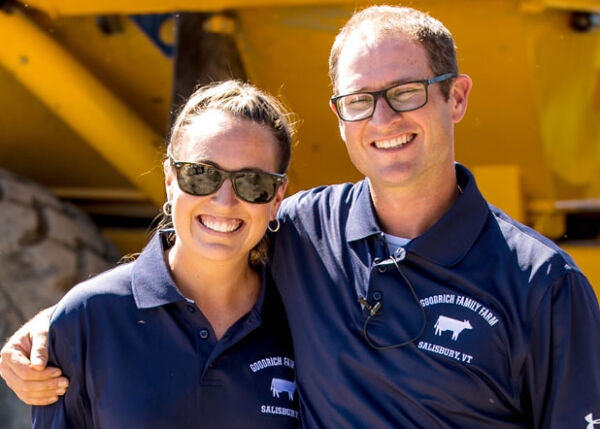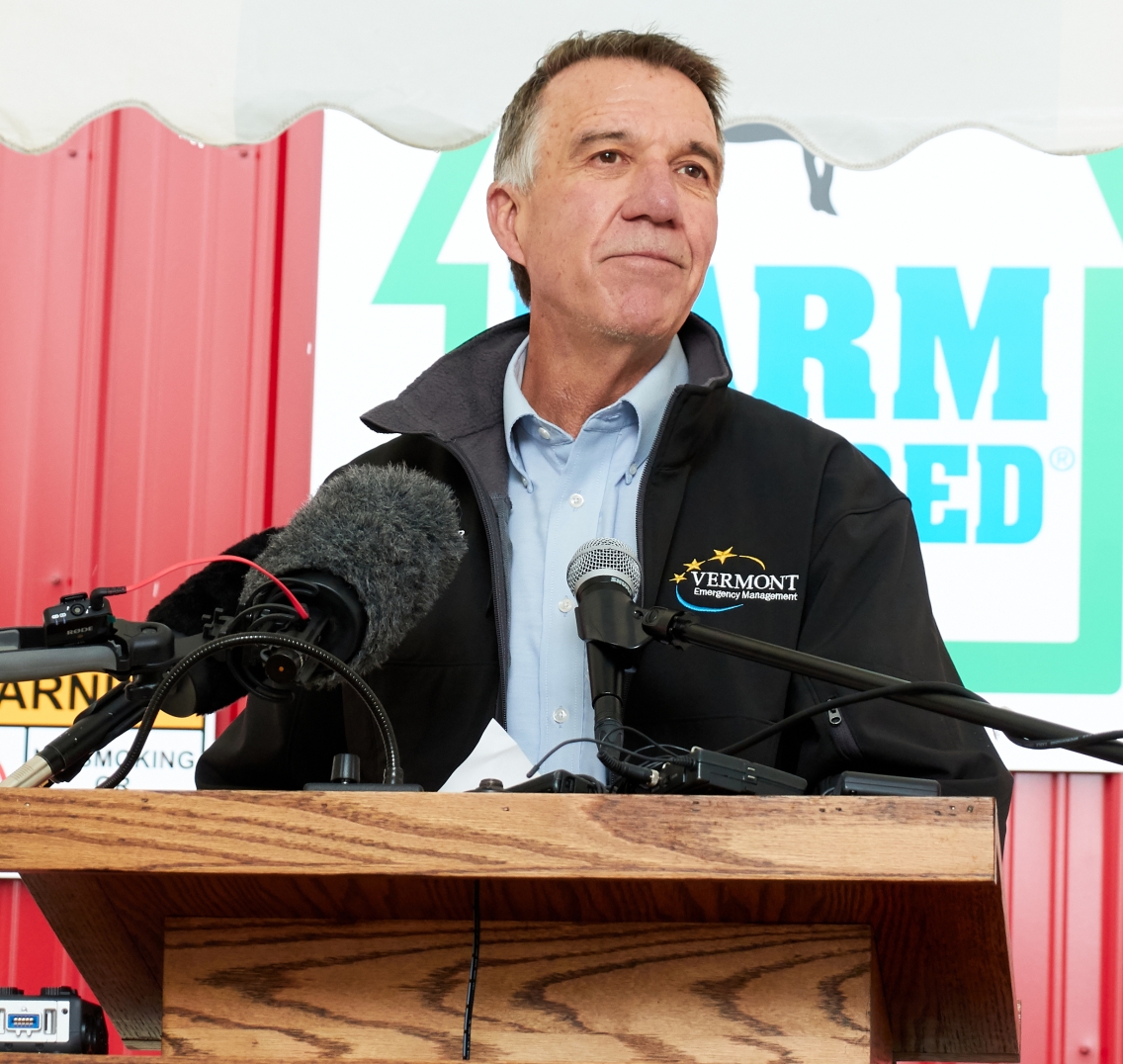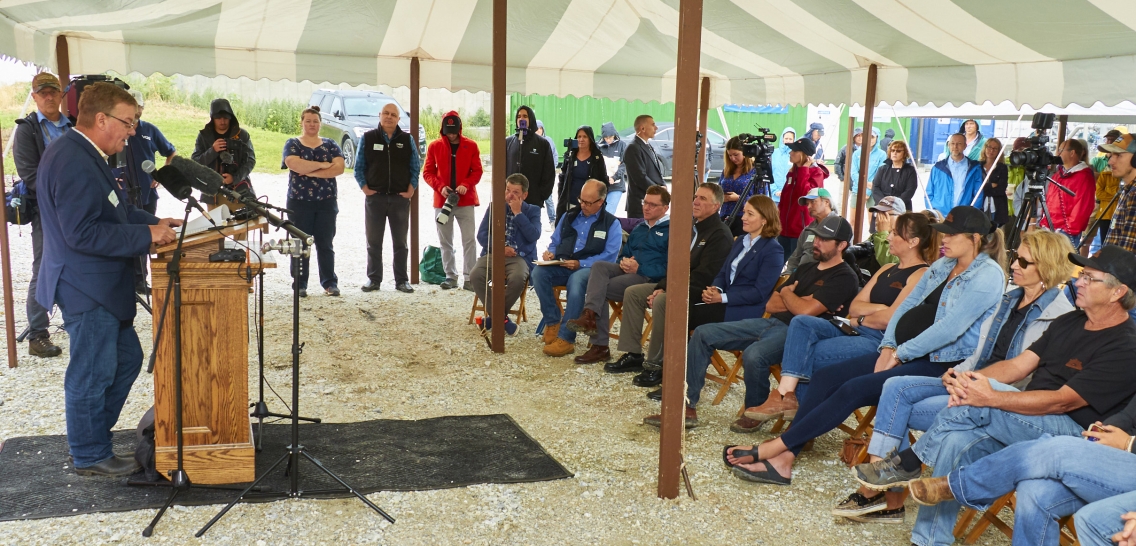Largest Anaerobic Digester in the Northeast Begins Production of Renewable Energy


“This project is the culmination of years of work by partners Goodrich Farm, VGS, Middlebury College, and Vanguard Renewables,” said John Hanselman, founder and chief executive officer at Vanguard Renewables. “I couldn’t be more proud than I am today to see this, the largest anaerobic digester in the Northeast, producing renewable natural gas and protecting the environment.”
VGS installed the infrastructure that will transport the RNG and make it available to Middlebury College as well as other customers who want to decrease their carbon footprint.
“The Goodrich Farm digester is the first star in a constellation of projects that will provide homegrown energy to Vermonters,” said Neale Lunderville, president and CEO of VGS. “This farm, which began in 1956 with 10 cows, not only turns food scraps and manure from its now 900-head herd into renewable energy; it also removes harmful methane from the atmosphere and phosphorus from the digestate that might otherwise drain into our watersheds and impact Lake Champlain. This is a great model, and we’re excited to continue working with our local farms to help Vermont meet its energy goals.”

David Provost, executive vice president for finance and administration at Middlebury, said the project represents a unique partnership between a renewables company, college, natural gas utility, and dairy farm.
“The digester is critical to Middlebury reaching its goal of using all renewable energy and continuing to diversify its fuel sources,” said Provost. “The completion of the facility also marks the fulfillment of a vision for the project that began 12 years ago.”
Middlebury College will buy about 55 percent of the gas produced annually from the project. The College’s switch to RNG will allow it to eliminate natural gas, a fossil fuel, that it currently uses as a supplemental energy source when its biomass system cannot meet its heating needs. The new facility will supply about one third of the energy that Middlebury uses for heating and cooling. The College’s biomass plant will continue to produce the other two thirds. The College will sell any excess RNG that it does not need on the open market.
Provost read remarks from Middlebury President Laurie Patton at the event. She called the project and partnership “an excellent opportunity to use energy that is produced right here in Addison County.
“It also offers our students and faculty new possibilities for research and projects, and benefits the entire community. We ask our community partners to be co-educators with us as we strive to meet our mission. Goodrich Farm and Vanguard Renewables have been exactly those kinds of partners. We are excited to be working together on this unique project.”
Hanselman said that the project also offers the following benefits:
● Spending in the Local Economy: Middlebury’s switch to RNG is a shift in energy spending to the local economy, similar to the shift made when the College went from No. 6 fuel oil to locally sourced wood chips in 2009. The anaerobic digester facility also employs a local operations workforce.
● Improved Air and Water Quality: The digestion process reduces the farm’s greenhouse gas emissions. The facility’s phosphorus removal system extracts potentially detrimental nutrients from the digestate before it is converted into fertilizer and applied to farmland. This step reduces the impact on the water quality of local streams and Lake Champlain.
● Fertilizer: The nutrient-rich by-product of the digestion process is a low-carbon fertilizer that increases the farm’s crop yields and replaces synthetic fertilizer use.
● Bedding: Before the manure enters the anaerobic digester, the liquids and the solids are separated, and the fibers become bedding for the cows.
● Learning Model: The anaerobic digester serves as a learning model for other farm and food waste businesses in the country.
● Research and Education: The new facility offers opportunities for research, student projects, and other educational enrichment resources.
Wellesley, Massachusetts-based Vanguard Renewables owns and operates five other farm-based anaerobic digesters in Massachusetts, has 10 new facilities under construction or in permitting nationwide, and plans to develop 100 projects by 2025.
Located on more than 2,400 acres, the Goodrich Family Farm is a multigenerational dairy farm and a member of the Agri-Mark Cabot Creamery Cooperative.
“Hosting the Farm Powered anaerobic digester means so much to our family,” said Danielle Goodrich Gingras. “It is part of our ongoing mission to do our best to care for our farm family, our animals, and the beautiful environment around us. And, to be good citizens in our community.”
“With this anaerobic digester project and the farm’s herd health and sustainable agriculture initiatives, the Goodrich Farm is setting an example for dairies in Vermont and across the entire country,” said Anson Tebbetts, Vermont secretary of agriculture.
Along with using 100 percent renewable energy sources, Middlebury’s Energy 2028 plan calls for reducing energy usage by 25 percent, divesting Middlebury’s endowment of investments in fossil fuels, and educating and involving the entire campus community in its implementation.
NOTE TO REPORTERS/EDITORS: More information, event photos, and B-roll video are available at https://vanguardrenewables.com/vanguard-renewables-media-room/.
Partner Information
Middlebury College
Founded in 1800, Middlebury is unique in being a liberal arts college that also offers graduate and specialized programs operating around the world. Its international focus is very strong, but Middlebury is rooted in Vermont, where its history is entwined with the state, Addison County, and the town of Middlebury, where it is located. Middlebury has established itself as a leader in campus environmental initiatives, with an accompanying educational focus on environmental issues in Vermont and around the globe.
Vanguard Renewables
Vanguard Renewables is the national leader in the development of food and dairy waste-to-renewable energy projects. The company is committed to advancing decarbonization by reducing greenhouse gas emissions from farms and food waste and supporting regenerative agriculture best practices on partner farms. Vanguard Renewables owns and operates six Farm Powered® anaerobic digester facilities in the northeastern United States, has 10 new facilities under construction or in permitting nationwide, and plans to develop 100 projects by 2025. Vanguard has established renewable natural gas partnerships with national utilities including Dominion Energy and ONE Gas, and with its 14,500-dairy member cooperative, Dairy Farmers of America. In December 2020, Vanguard launched the Farm Powered Strategic Alliance alongside food industry leaders Dairy Farmers of America, Unilever, and Starbucks. The Alliance commits to developing a circular solution for food waste reduction and recycling, and the decarbonization of food supply chains and manufacturing. Please visit vanguardrenewables.com to learn more.
VGS
VGS is a leader in energy efficiency and innovation, offering a clean, safe, affordable choice for over 54,000 homes, businesses, and institutions in Franklin, Chittenden, and Addison Counties. The company plays an important role in Vermont’s clean energy future by displacing higher-emitting fuels, offering renewable natural gas service, and delivering award-winning energy efficiency programs. VGS is leading the country in the development of local renewable energy generation and has targeted a 30 percent reduction in greenhouse gas emissions by 2030 and full elimination by 2050. For more information about Vermont Gas, visit www.vgsvt.com.

